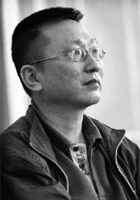Bai Hua
Bai Hua Poems
These innocent messengers
wearing plain summer clothes
sitting here, by my side
...
Ten nights, ten nights in a row
Autumn is near, leaves turn yellow
your teacher is thinning away
...
I'm spreading word about your reputation —
a child who stole three cakes
a child who couldn't idle away an afternoon
...
Early morning, what is the quivering calmness evading?
Karlstad! Tall gods and goddesses flash by
...
Through all ages the river never disposes of a voice
you listen, I listen
that voice
...
A day in late spring
I've just finished my diary:
Sand from the wind in the north
...
The cloud diviner scurries by
scanning from heights
In his eyes, the dense dusky mist
...
Bai Hua Biography
Bai Hua (白桦) (born 1930 in Xinyang, Henan), originally named Chen Youhua (陈佑华), is a Chinese playwright and poet. He started publishing poems at the age of fifteen under his current name. Subsequently, he joined the People's Liberation Army in 1947, but was labeled a "rightist" in 1957. He worked in a Shanghai film studio in the early 1960s, and produced several influential dramas and films in the late 1970s and early 1980s. Currently he is living an obscured life in Shanghai with his wife. Bai Hua gained his national fame for his plays based on uncompromised historical criticism. Some of his plays were banned because of the description of the political purges and murders in the Red Army in the 1930s and his critical view on the traditional patriotic value. Among these the most famous was the film Portrait of a Fanatic (1982), which was never shown in the public. In this film, Bai depicted an oversea Chinese painter who returned to China in order to devote his life to his motherland but ended up suffering the political prosecution and death. The painter's daughter asked her father a highly sensitive question in the film: "You love your motherland, but does the motherland love you?" The paramount leader Deng Xiaoping was annoyed by the film, who personally organized the old guards to launch a political campaign against Bai in the national media for his violation of the political dogma dictated by Deng (namely the leadership of the party). The criticism threatens to become another wave of political prosecution until the General Secretary of the party Hu Yaobang interfered on his behalf. The significance of this episode is that it effectively split the party into two camps, which was going to influence the events of the decade. Bai was later allowed to visit Japan and Southeast Asia and delivered public speeches, but his works were generally suppressed. His late epic poem From Qiu Jin to Lin Zhao was never published.)
The Best Poem Of Bai Hua
Remembrance
These innocent messengers
wearing plain summer clothes
sitting here, by my side
smiling at me
revealing subtly their old, shy breasts
That once ardent voyage
that ignorant fatigue
all stop in this foreign moment,
a kindly and teary moment
Age, so much obeisance
local Mandarin…..(is it necessary?)
gentle, lustful dentures
a gust of fire
I concentrate my energies and can see
the afternoon breeze
blowing across gazes that meet
Such melancholy
such frank benevolence
and romantic gaieties of old times
Ah, these innocent messengers
ceaselessly on the move
coyly knocking on the door
harboring love and admiration
arriving in my life of so few experiences
Translated from the Chinese by Fiona Sze-Lorrain
